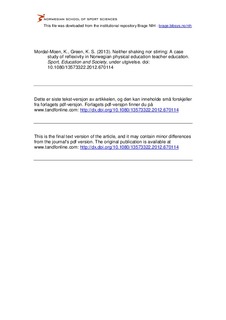| dc.contributor.author | Moen, Kjersti Mordal | |
| dc.contributor.author | Green, Kenneth Stanley | |
| dc.date.accessioned | 2014-03-19T08:46:14Z | |
| dc.date.available | 2014-03-19T08:46:14Z | |
| dc.date.issued | 2012-03-28 | |
| dc.identifier.citation | Sport, Education and Society. 2013, under utgivelse. doi:10.1080/13573322.2012.670114 | nb_NO |
| dc.identifier.uri | http://hdl.handle.net/11250/192628 | |
| dc.description | I Brage finner du siste tekst-versjon av artikkelen, og den kan inneholde ubetydelige forskjeller fra forlagets pdf-versjon. Forlagets pdf-versjon finner du på www.tandfonline.com: http://dx.doi.org/10.1080/13573322.2012.670114 / In Brage you'll find the final text version of the article, and it may contain insignificant differences from the journal's pdf version. The original publication is available at www.tandfonline.com: http://dx.doi.org/10.1080/13573322.2012.670114 | nb_NO |
| dc.description.abstract | This paper examines the place of reflexivity in the ‘philosophies’ and practices of physical education (PE) teacher educators in Norway. Using a case study approach to one quite typical institution delivering physical education teacher education (PETE) in Norway, semi-structured interviews were conducted with 15 teacher educators. Analysis of the data generated by the study was inspired by the principles of grounded theory. Noteworthy among the findings was that the teacher educators viewed learning to teach PE in much the same way as they viewed PE itself—as an essentially practical process revolving around the teaching and coaching of sports skills. Consequently, there was little evidence that the teacher educators either engaged themselves or sought to develop in their students anything other than weaker forms of reflexivity; that is, focusing on the student teachers’ development of their practical sporting and teaching skills. The discussion focuses on the contextual constraints—in the form of a combination of local and national contexts—that served to encourage the teacher educators at Nord University College to reproduce the kinds of (typically conservative) ideologies and practices in PETE that they were already habitually predisposed towards. In light of the evidence from this study, the paper concludes by reconsidering the claim that the rise of reflexivity as a dominant concept and a generic professional disposition has been one of the major trends in teacher education generally and PETE in particular. | nb_NO |
| dc.language.iso | eng | nb_NO |
| dc.publisher | Taylor & Francis | nb_NO |
| dc.subject | VDP::Samfunnsvitenskap: 200::Samfunnsvitenskapelige idrettsfag: 330::Andre idrettsfag: 339 | nb_NO |
| dc.subject | physical education | nb_NO |
| dc.subject | physical education teacher education | nb_NO |
| dc.subject | reflexivity | nb_NO |
| dc.subject | habitus | nb_NO |
| dc.subject | Norway | nb_NO |
| dc.title | Neither shaking nor stirring: A case study of reflexivity in Norwegian physical education teacher education | nb_NO |
| dc.type | Journal article | nb_NO |
| dc.type | Peer reviewed | nb_NO |
| dc.source.journal | Sport, Education and Society | nb_NO |
| dc.identifier.doi | 10.1080/13573322.2012.670114 | |
| dc.description.localcode | Seksjon for kroppsøving og pedagogikk / Department of Physical Education | nb_NO |
